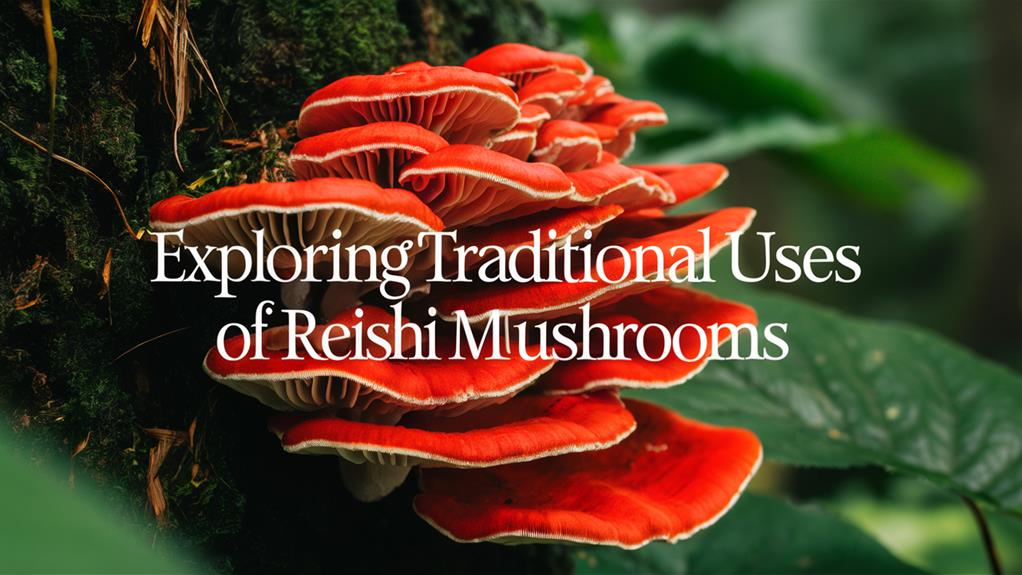
Reishi mushrooms, known as the "Mushroom of Immortality," have been valued in traditional Chinese medicine for over 2,000 years. They're celebrated for boosting health and longevity, often linked to ancient texts that describe their effects on vital energy. In addition to enhancing immune function, reishi is used for relieving stress and improving sleep. Cultures consider them symbols of good fortune and prosperity, intertwining health benefits with spiritual practices. You can prepare reishi in teas, tinctures, or powders for easy consumption. Discover more about their unique properties and modern applications as you explore their rich traditions.
Historical Significance
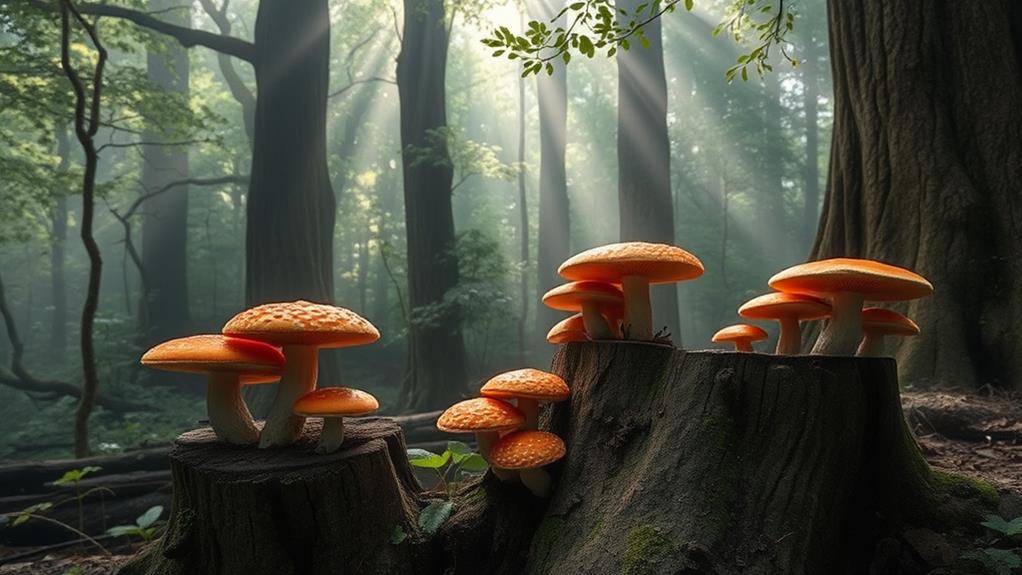
Reishi mushrooms, or Ganoderma lucidum, have played a crucial role in traditional Chinese medicine for over 2,000 years, often hailed as a powerful elixir for health and longevity. Known as the "Mushroom of Immortality," Reishi was highly prized for its medicinal properties and is recognized for its health benefits that include immune support and cognitive enhancement.
In ancient texts like the "Shen Nong Ben Cao Jing," this mushroom is celebrated for its tonifying effects and ability to enhance vital energy.
Because of its rarity in the wild, Reishi was mainly accessible to nobility, which added to its legendary status. Ancient Asian physicians commonly used Reishi for various health concerns, particularly for immune system support and respiratory issues.
Its historical significance in herbal medicine reflects a deep-rooted belief in its potential to promote well-being and longevity.
As you explore the uses of Reishi, you'll see how its importance extends beyond just health benefits. In many Asian cultures, Reishi symbolizes strength and spiritual potency, showcasing its cultural significance throughout history.
Cultural Uses and Beliefs
Reishi mushrooms have played an important role in various cultures, especially in Asia, where they symbolize health and longevity.
Their rich nutritional profile, including essential minerals and vitamins, has contributed to their reputation as a powerful health booster.
You might find it fascinating that ancient texts describe them as an elixir of immortality, highlighting their significance in spiritual and healing practices.
From promoting well-being in Japanese ceremonies to treating health issues in Chinese medicine, Reishi mushrooms truly embody a blend of cultural beliefs and medicinal properties.
Historical Significance in Medicine
The allure of reishi mushrooms, often hailed as the "mushroom of immortality," has captivated cultures for over 2,000 years. Known scientifically as Ganoderma lucidum, these mushrooms have been integral to traditional Chinese medicine.
Ancient texts, like the herbal compendium Shen Nong Ben Cao Jing, describe their use for enhancing vital energy and promoting overall health. This historical significance underscores their role in wellness, paralleling our modern commitment to fostering a community around mushroom knowledge and exploring their benefits in various contexts, including health and spirituality a comprehensive range of mushroom products.
In various Asian cultures, reishi mushrooms symbolize good luck and health, often used as talismans by nobility and traditional healers. Their rarity in the wild made them even more esteemed, granting them a reputation as a cure-all for many ailments.
Here are some key aspects of reishi mushrooms' historical significance:
- Promoted Longevity: Valued for their potential to extend life.
- Boosted Immune Support: Linked to enhancing the body's defenses.
- Addressed Chronic Disease Management: Used in treatments for long-term health issues.
- Spiritual Potency: Believed to bring good fortune and well-being.
Modern research continues to validate these ancient claims, exploring the health benefits of reishi mushrooms today.
Symbol of Longevity
Throughout history, the allure of Ganoderma lucidum, or reishi mushrooms, has made them a powerful symbol of longevity in various cultures. Known as "Lingzhi" in Chinese, these mushrooms have been revered for over 2,000 years in traditional Chinese medicine. Ancient texts, like the "Shen Nong Ben Cao Jing," highlight their health benefits, emphasizing their ability to enhance vital energy and promote long life.
In many Asian cultures, you'll find reishi mushrooms depicted in artworks and folklore, symbolizing good fortune and health. They're often linked to spiritual potency, offering protection against illnesses. Wild reishi was once rare, mainly available to nobility, which reinforced its status as a symbol of wealth, health, and longevity in society.
The cultural significance of reishi transcends its medicinal uses; they play a crucial role in traditional rituals and practices aimed at achieving balance and well-being.
Spiritual and Healing Practices
For many, the spiritual and healing practices surrounding Ganoderma lucidum, or reishi mushrooms, represent a profound connection to both nature and the divine.
These mushrooms are often called the "mushroom of immortality," deeply rooted in Taoist practices. Ancient texts, like the "Shen Nong Ben Cao Jing," highlight their remarkable medicinal properties, which promote tranquility and mental clarity.
When you engage with reishi in spiritual rituals, it's believed to enhance your healing journey, helping you achieve a higher state of consciousness. Many people consider it a way to balance their Qi, or life energy, which is essential for overall health.
Here are some key aspects of reishi's cultural significance:
- Enhances longevity and spiritual development
- Promotes mental clarity and tranquility
- Serves as a symbol of good fortune and prosperity
- Used in ceremonies to attract positive energy
Traditional Medicinal Applications
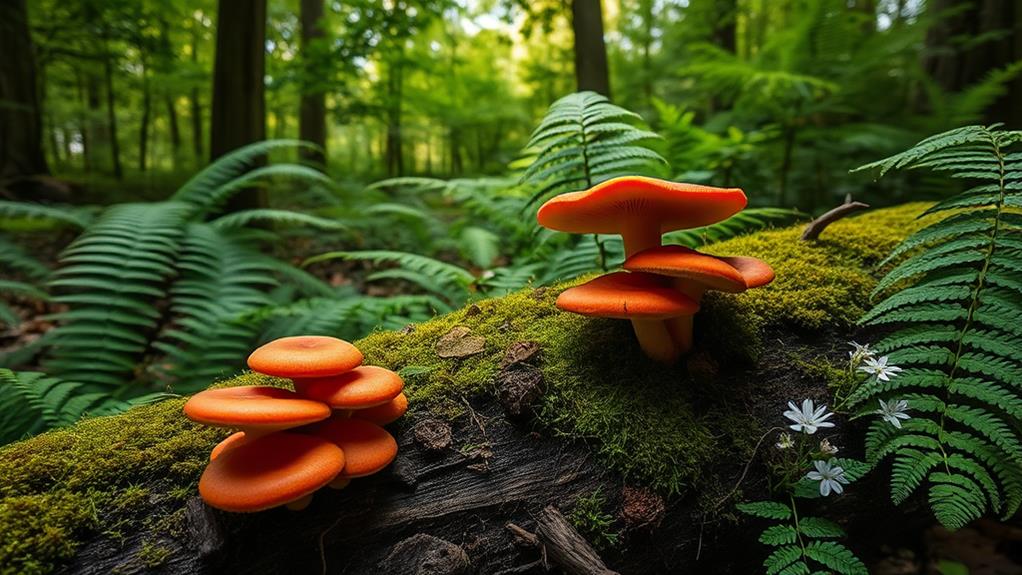
Reishi mushrooms have a rich history in traditional medicine, dating back over 2,000 years in Chinese culture.
You'll find these mushrooms praised for their potential to boost health, enhance longevity, and even relieve stress.
As you explore their traditional uses, you'll see how reishi has become an important part of both herbal remedies and culinary practices.
Historical Significance in Medicine
Throughout history, reishi was often reserved for emperors and nobility due to its rarity, further enhancing its status as a symbol of immortality and well-being.
You may find it fascinating that reishi has been used to:
- Enhance vital energy and support immune function.
- Alleviate conditions like insomnia and anxiety.
- Promote anti-aging effects and overall health.
- Serve as a talisman of luck in spiritual practices.
These medicinal applications across different cultures illustrate reishi's key role in enhancing vitality and health.
Cultural Uses and Beliefs
Many cultures have embraced reishi mushrooms not just for their health benefits, but also for their deep-rooted spiritual significance. Known as Lingzhi in China, these mushrooms have been revered for over 2,000 years as the "mushroom of immortality." In traditional Chinese medicine, you're likely to find reishi used to tonify vital energy, or Qi, support immune function, and improve mental clarity. This makes them a staple in many holistic health practices.
Beyond their medicinal uses, reishi mushrooms carry a strong spiritual potency. They've been historically used in rituals and ceremonies aimed at promoting well-being and harmony within individuals and communities. Cultural beliefs surrounding reishi emphasize balance in the body, especially in managing stress and emotional well-being. This aligns with their role as a natural adaptogen, helping you adapt to life's challenges.
Additionally, many Asian cultures view reishi mushrooms as symbols of prosperity and good fortune. It's common for people to give reishi as gifts or offerings, believing it brings health and abundance to the recipient's life. Through these traditions, reishi mushrooms continue to play an important role in health and spirituality.
Preparation and Consumption Methods
When it comes to preparing and consuming reishi mushrooms, there are several effective methods to harness their health benefits. One popular way to enjoy reishi is by making tea. You can simmer fresh or dried reishi mushrooms in boiling water for at least two hours. This long preparation extracts their beneficial compounds, making the tea rich in health benefits.
Additionally, the bitter flavor of reishi can enhance hot teas and clear soups. You might consider adding olive oil, salt, and pepper to improve the taste.
Here are some other consumption methods you might find useful:
- Cooking Medium: Use reishi-infused liquid for cooking rice or other dishes, incorporating its immune-boosting properties into daily meals.
- Dietary Supplementation: Powdered reishi is available in capsules or tinctures for easy and concentrated consumption.
- Traditional Chinese Medicine: Regular consumption is often recommended to maximize the benefits of reishi.
- Versatile Ingredients: You can add powdered reishi to smoothies or baked goods for a nutritional boost.
Bioactive Compounds and Benefits
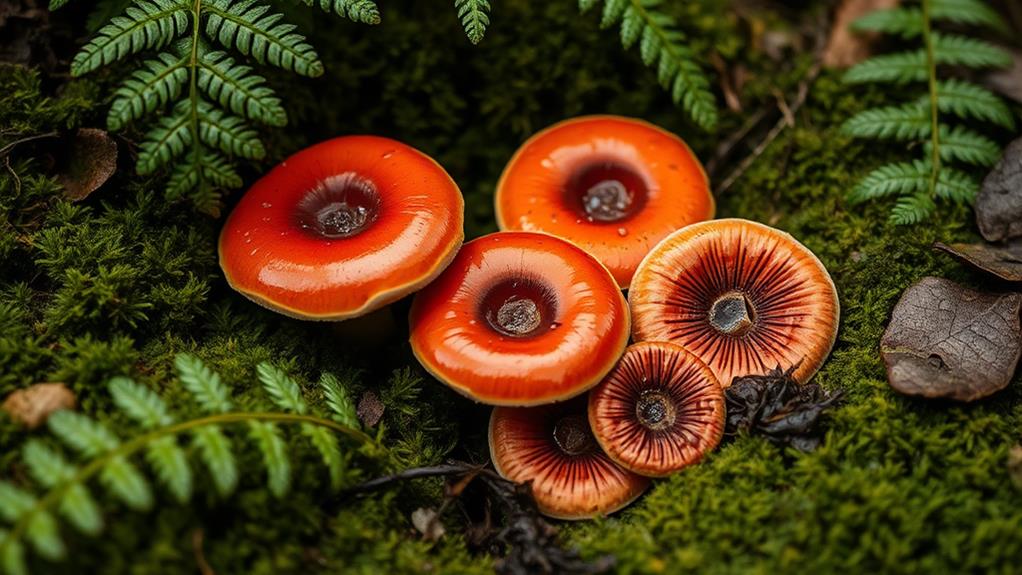
Although reishi mushrooms are often praised for their health benefits, it's the bioactive compounds within them that truly set them apart. Ganoderma lucidum, the scientific name for reishi, contains important bioactive compounds like polysaccharides and triterpenoids. These compounds are known for their antioxidant, anti-inflammatory, and immune-boosting properties.
Polysaccharides in G. lucidum can help improve glucose metabolism, which is beneficial for managing diabetes and enhancing overall health.
Meanwhile, triterpenoids are recognized for their strong anti-inflammatory and antioxidant activities, supporting the mushroom's reputation for promoting longevity and wellness in traditional medicine.
Research has identified over 432 secondary metabolites in G. lucidum, including 380 terpenoids, which may even have potential anticancer effects.
However, the levels of these bioactive compounds can vary based on cultivation conditions and extraction methods, impacting their therapeutic efficacy.
Modern Research and Findings
Recent studies have shed light on the impressive potential of reishi mushrooms, particularly through the lens of modern research. Scientists have focused on Ganoderma lucidum, discovering its remarkable benefits. For instance, polysaccharides from this mushroom can enhance immune function and improve insulin sensitivity in diabetes models.
Additionally, research suggests that G. lucidum extracts may inhibit coronavirus infection, although further clinical validation is needed.
Here are some key findings related to G. lucidum:
- Immunomodulatory effects: Polysaccharides stimulate natural killer (NK) cell activity and enhance T lymphocyte proliferation.
- Cancer treatment: Evidence shows that G. lucidum can enhance chemotherapy efficacy and inhibit tumor invasion in various cancer models.
- Cardioprotective effects: Clinical trials indicate improved blood glucose and lipid profiles in certain populations.
- Traditional uses: These modern findings align with the historical significance of reishi mushrooms in holistic health practices.
As you explore the science behind reishi mushrooms, it's exciting to see how their traditional uses continue to resonate with contemporary health research, providing hope for various health challenges.
Side Effects and Precautions
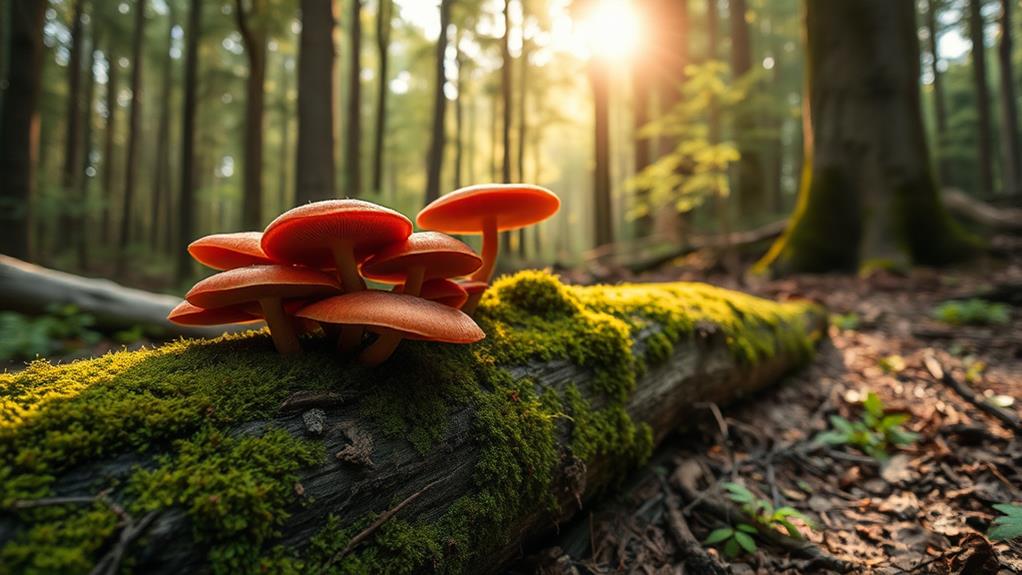
While reishi mushrooms offer numerous health benefits, it's important to be aware of potential side effects and precautions associated with their use. Ganoderma lucidum can cause side effects like nausea, insomnia, dizziness, and stomach upset, so it's wise to monitor how you feel during consumption.
Another serious concern is the documented risk of liver injury, with some formulations linked to severe cases of fulminant hepatitis.
If you're on anticoagulant medications, be cautious, as reishi may increase your bleeding risk. High doses can lead to adverse effects, so it's best to limit your intake and consult healthcare providers before starting any new regimen.
Additionally, safety during pregnancy and breastfeeding hasn't been established. If you're pregnant or nursing, it's advisable to avoid reishi unless under medical supervision.
Taking these precautions seriously can help you enjoy the benefits of reishi mushrooms while minimizing potential risks. Always prioritize your health by staying informed and seeking advice from professionals when needed.
Future Directions in Use
There's a growing interest in the future applications of Reishi mushrooms (Ganoderma lucidum) within various fields of health and medicine. Researchers are excited about how these mushrooms can contribute to several important areas, especially in clinical trials.
- Cancer therapy: Reishi mushrooms may enhance the effectiveness of treatments like cisplatin against cancer cells.
- Cardiovascular health: Studies show they could help manage cardiovascular risk factors and improve lipid profiles.
- Diabetes management: Polysaccharides in Reishi may boost insulin sensitivity, aiding in weight reduction for those with obesity.
- Antiviral potential: Ongoing research suggests Reishi extracts might inhibit respiratory infections, including coronaviruses.
To fully realize these benefits, there's a need for high-quality, standardized Reishi products. Consistency in bioactive compound levels is crucial for ensuring both safety and efficacy in therapeutic use.
As clinical trials progress, the potential of Ganoderma lucidum could lead to innovative treatments that enhance health outcomes across various conditions. Your awareness of these developments could be vital as the landscape of health and wellness continues to evolve.
Conclusion
In exploring the traditional uses of reishi mushrooms, you've discovered a rich history and a variety of cultural beliefs that highlight their significance. From ancient medicine to modern research, these fascinating fungi continue to captivate people. Isn't it amazing how something so small can hold such power? As you consider incorporating reishi into your life, remember the wisdom of those who came before us and the potential benefits that await in this remarkable mushroom.
